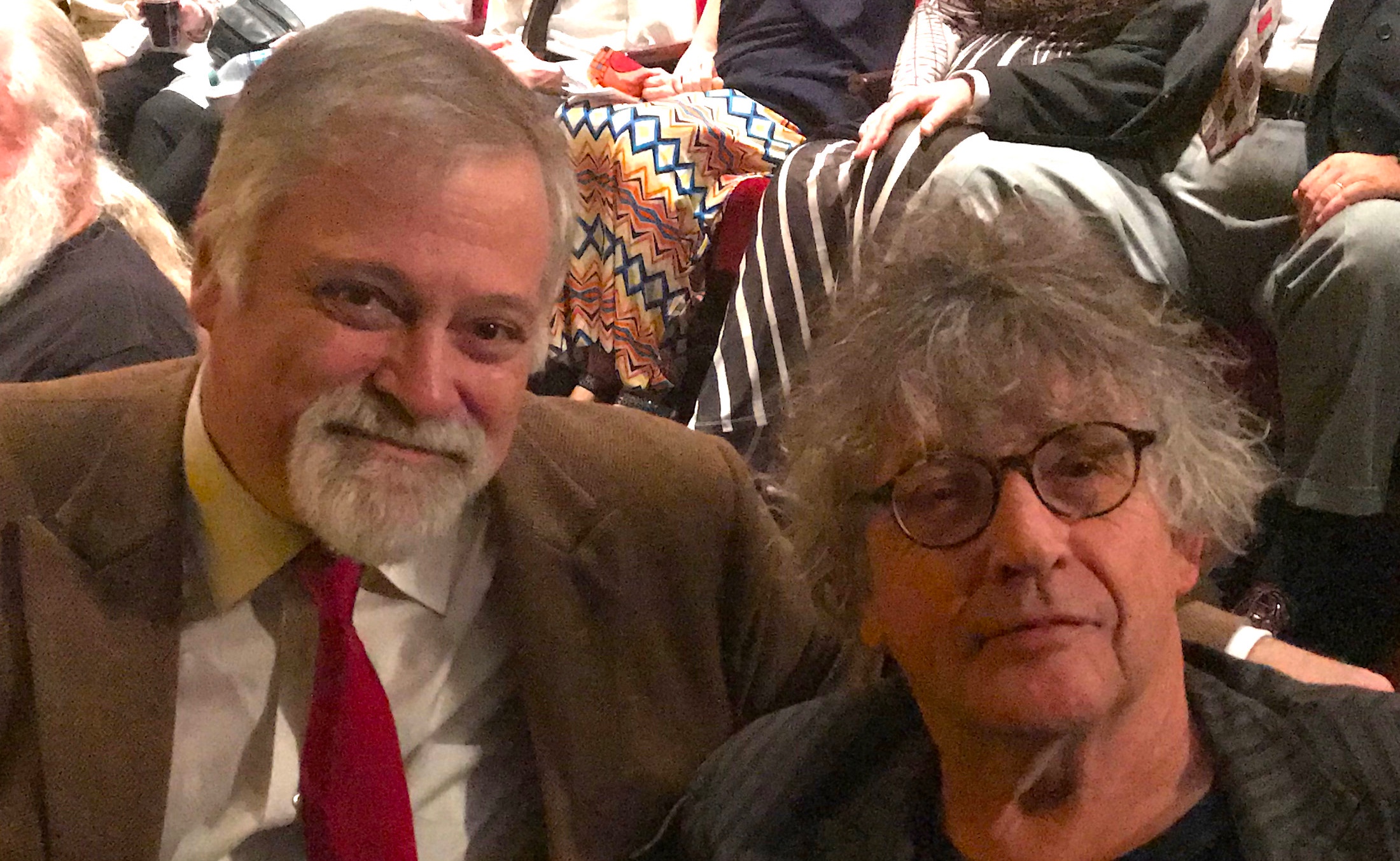Muldoon Songs (1992)
For Voice and Piano
Duration: 15’
Movement Titles: The Waking Father | Thrush | Blemish | Mink | Bran | Vico | Holy Thursday
First Performance: 12 February 1992 / Friends & Enemies of Music Concert Series / Greenwich Music House, New York City / Paul Sperry, tenor / Daron Hagen, piano
Dedication: "Commissioned by and dedicated to Paul Sperry."
Text: Paul Muldoon (E)
Publisher: Carl Fischer
Buy Sheet Music: Purchase Sheet Music | JW Pepper | Front
Recordings: iTunes | Arsis | iTunes2 | MSR | Spotify 1 | Spotify 2
Daron Hagen and Paul Kreider, June 15, 1999, Las Vegas, NV. p/c: Rebecca Kreider
Selected Review:
Composed in 1989 for tenor Paul Sperry, these settings of six poems by Irish poet Paul Muldoon form a cycle that centers on the experience of loss. The various kinds of loss -- of relationships, of perfection, of life, of youth -- are seen and experienced in unusual imagery that hints at the reality behind the scene. The vocal lines are quite lyrical in spite of featuring many octave leaps. The melodies are patterned and frequently repetitive, containing numerous different rhythmic diversions for word stress. The setting is mostly syllabic with a few slow melismas, and there are many dynamic and expressive markings. The tenor who sings this cycle will need a solid and warm low B, as it is frequently used, and the cycle ends softly on a low B-flat. The piano parts are mostly chordal in structure and supportive in nature with frequent counter-melodic interplay with the vocal line. Frequent key signature changes in Holy Thursday will require attention. This would be good recital material for a senior or graduate tenor with a solid command of his range from B-flat(3) to A-flat(5) and an understanding of the poetry.
—NATS Journal of Singing
[Of Brian Thorsett’s recording, accompanied by Tracy Cowden, on MSR Classics] of Muldoon Songs, commissioned by the renowned tenor Paul Sperry, who premiered the cycle with the composer at the piano in 1992. The title refers to the poet Paul Muldoon, whose texts are set here. (It’s worth mentioning that Hagen has produced 24 song cycles so far.) Brian Thorsett is a brilliant tenor, his voice plangent and supremely expressive. There is a touch of the Peter Pears about him; the penultimate song, “Vico,” is gloriously light and witty, in maximal contrast to the crepuscular, radiantly beautiful “Holy Thursday.”
—Colin Clarke, Fanfare Magazine, Jan/Feb 2022
More than a usual listening experience, [Thorsett’s] recording [of Muldoon Songs] results in an extraordinary adventure in music and song, inviting us to explore the “over the top” genius of Daron Hagen.
—Joel Thompson, October 2021, Cherry Grove Music
Program Note:
The Waking Father is marked “big, exuberant.” Robust four-octave-wide rolled chords and two-handed trills in the piano part signal the character's effusive nature; generous octave leaps in the vocal part testify to his conspicuous virility; rapid shifts in mood and dynamics mirror his mercurial temperament. His exterior pronouncements are in D major and occur at a tempo twice as fast as his interior thoughts, which are in F major, resulting overall in a rondo form.
Thrush is about fecklessness, mental stagnancy, and impotence. A two-bar accompaniment pattern in the piano skulks around e minor (the song's alleged key) but never properly settles on it before ineffectually repeating. The poem's one forceful image is that of a fist, and the song climaxes downwards on that word, marked agnosciato and sforzando. The onanistic melancholy following the climax is marked “suddenly remote” and is given a little augmented 13 chord sting before collapsing back into the whimpering two bar pattern again to close. The strophic form that results mirrors the singer's obsessive return to the same emotional starting point; the slippery harmonies highlight his emotional evasiveness and lack of character.
Next come a pair of very short songs. Blemish is a skit about a girl with one brown and one blue eye. My synesthetic reaction to B major is to “hear” blue, and when I hear E flat major I “see” brown. Hence, the song is bi-tonal, with these two keys alternating hands every bar. The voice part is marked “in a single breath,” so it should be performed at a quick enough tempo to make that possible. The next song, Mink is about Captain Robert Nairac, who was abducted and murdered by the Irish Republican Army in 1977 and whose body was never found. While Blemish disarms, this song either slaps (for one who knows who Nairac was) or passes by harmlessly if he doesn't.
Bran is the first poem of Muldoon's that I set to music. It is “through composed.” The piano begins with a rising octave and the fall of a minor third in A-flat major, as though it were a mother calling her child in for dinner as he cradles a beloved Labrador; it repeats the figure in the background as the singer contrasts his very adult impression of rapture in a lover's arms. The singer signals his empathetic adult union with his mother in measure 34 by singing the words “who knows” to the same figure that his mother called him in to dinner with as a child. Memory and the present then join at the end when the song climaxes (with a flowering melisma) on the word “rapture.” There's a pungent, adult, post-coital pang in measure 44 before the song ends -- not nostalgically but at peace -- in F major.
The squirrel running on a treadmill in Vico becomes a clattering, circular, staccato ostinato in the piano (and a legato one in the voice part) that underpins the singer as he rattles off the names of life's various components. Since the vocal part, trapped as it is by its melody, cannot climax in range, the sudden forte on the words “hand wringing” serve as the climax -- the singer's one true attempt to break out, psychologically, from the melodic and rhythmic ostinato of his 'wheel.' This song continues without pause into the final song.
Holy Thursday, along with the weight that it carries as part of the Church calendar, is a firsthand description of a couple's after-hours breakup in a closed restaurant. The two-measure chord progression that is varied throughout is an allusion to the two-bar bridge of Gershwin's The Man I Love, which I imagine to be playing quietly in the background. There are two climaxes: the first is on the word “over” and the second is a counterbalancing melismatic release on the word “smiles” as the progression (after moving through several keys with the singer as they describe the situation) returns to the opening key of E-flat major. The cycle ends with a murmured “absence” on a low B-flat.
Commissioned by Paul Sperry, the Muldoon Songs were composed in 1989 at the Camargo Foundation in Cassis, France, and at the MacDowell Colony, in Peterborough, New Hampshire. I accompanied Paul in the premiere of the cycle on the “Friends and Enemies of Contemporary Music” concert series in February 1992 at the Greenwich Music House in New York City.
From Vocal Repertoire for the 21st Century:
This chapter explores the Muldoon Songs by Daron Hagen. This succinct, appealing cycle comes from a generous, attractively presented volume, replete with notes by both the composer and Paul Sperry, who has done so much for contemporary art song. This cycle consists of seven contrasting songs; the third and fourth mere fragments. The sixth was added last, at the request of Paul Sperry, who commissioned the piece. Much of the intriguingly acerbic text is set straightforwardly. Through this cycle, Hagen shows a masterly grasp of the voice–piano idiom, along with a love of words, and a refined instinct for setting them. His writing seems unfettered and entirely natural, encompassing an exceptionally wide range of styles with unerring craftsmanship and sometimes deceptive simplicity. Indeed, as this chapter shows, the music breathes freely, maintaining elasticity and rhythmic verve.
—Jane Manning, Vocal Repertoire for the 21st Century



